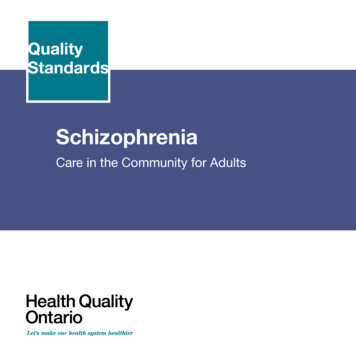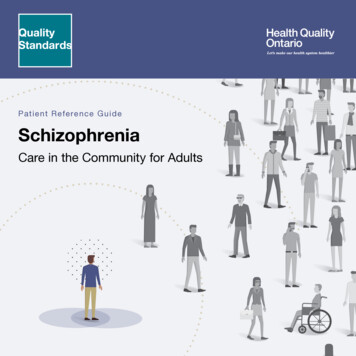
Transcription
Preparing for Schizophrenia CarePlanningOtsuka Pharmaceuticals UK Ltd and Lundbeck Ltd provided funding to support the preparation of this guideUK/AM/0116/0002a(1)February 2016
1.This guide is designed for carers and familiesof people with schizophrenia to provideyou with information about care planning,which is an important aspect of supportingpeople with mental ill health to access thecare and treatment that they need. This isa particularly important process for peoplewith schizophrenia.If you care for a person with schizophrenia,particularly if they have only recentlyreceived their diagnosis, the care planningprocess can be overwhelming, and difficultto understand and to prepare for. With aneffective care plan, the person you care foris more likely to have greater confidenceand a greater sense of control overmanaging their condition.This guide covers the following:011. What is a schizophrenia care plan?022. Why do I need to prepare for the care planning discussion?033. What should I expect from the care planning discussion?044. Things to consider ahead of the discussion055. How can I ensure the care plan is put into action?076. Further information and support087. My contacts09Schizophrenia care planning preparation guideWhat is a schizophreniacare plan? A care plan is an agreementbetween a patient and health andsocial care professionals, to helpthem manage their health ona day-to-day basis T he NHS Mandate states that every personwith a long-term condition, including mentalhealth problems, should be offered apersonalised care plan as soon as possibleafter diagnosis1. This includes peoplewith mental ill health and those living withschizophrenia S ince April 2015 all carers are entitledto a carer’s assessment from their localauthority2. Many mental health trustsprovide these too. The carer’s assessmentwill look into how caring affects yourlife, including your physical, mental andemotional needs, and whether you are ableor willing to carry on caring T he care plan should be developed as acollaboration between the person it is beingwritten for, their care coordinator and theircarer, with a copy of the plan then sent tothe healthcare professional or service who/which made the first diagnosis A fter your assessment, you can agree asupport plan with your local authority whichwill set out how your needs will be met inthe future A carer’s assessment might reveal issuesthat should be covered in the care planof the person you care for. If your carer’sassessment shows that the time thatyou spend caring for the person withschizophrenia is having an impact on yourphysical or mental health, you might try toreduce this impact through the care planof the person you care for02
2.Why do I need toprepare for the careplanning discussion?A care plan should set out the support thatwill be provided to the person you care for,and who will provide it to them. It should bea ‘live document’ shared between you, theperson you care for and a care coordinator.Each of you will be able to contribute to thecare plan and to share your views of what itshould contain.It can be easy to feel that you might not belistened to in the care planning process. Thiscan particularly be an issue where the personyou care for has not given consent for theprofessionals involved in their care to shareconfidential information with you. You candiscuss this with the person you care for,and they can sign a consent form for theprofessionals involved in their care to shareas much or as little about their care with youas they like3.They can also provide an ‘advancestatement’, which would explain what theywould like to happen, and what informationthey would consent to being shared, in theevent of a mental health crisis or relapsethrough which they may lose the ability tomake decisions for themselves.Even without this consent, health careprofessionals should still listen to yourconcerns or views as a carer, as thisinformation could be valuable in improvingthe care offered to the patient. As their carer,you play a vital role in their wellbeing and inthe management of their condition, and itis important that you are able to contributeto their care plan. The person you care foris able to speak to health care professionalsseparately if they feel there are things theyare unable to say in front of their carer; whilea carer can also seek the same advice if theyfeel there are things they are unable to say infront of the person they care for.3.What should I expectfrom the care planningdiscussion?Care coordinatorThe person you care for should have a carecoordinator, and this person will work with themto develop a care plan4. A care coordinatorcould be a social worker, community psychiatricnurse or an occupational therapist. The mentalhealth team who support the person you carefor can also help you with the care planningprocess, and may be able to give advice as towhat you should try to include.What could the care planningdiscussion cover?The care planning discussion should covera number of areas, which can range from thesymptoms experienced by the person youcare for and the history of their illness to theirhousing and employment needs. The careplanning discussion should last around halfan hour5.The result should be a care plan which bringstogether in one place the needs of the ‘wholeperson’ going beyond their treatment to coverall aspects of their life which are affected byschizophrenia. It should include the differentsupport services which the person you carefor may need to access.A care plan is a valuable tool to help youto set both the person you care for, andyourself, realistic goals for their recoveryand the management of their condition andto plan for what should happen in the eventof a crisis. This is why preparing for a careplanning session, and thinking ahead to whatthis might involve, is so important.Jobs,educationand therapyAdvice andsupportMedication03Schizophrenia care planning preparation guideFinanceadviceCommunityservices04
4.Things to considerahead of the discussionThink about how the person you carefor could benefit from a care plan,and what support they most need.Are there clear, realistic goals thatcould be set to address these needs?Have there been any particularlydifficult episodes or events recentlythat you would like to discuss?Is this your first care planning discussion?If you have had discussions about careplanning before, it will be important to look atwhat you covered last time so you can reviewprogress and revisit any queries that arose.It might be worth writing down any questionsyou have that come to mind.What does the person I care for need fromtheir care plan?Think about how the person you carefor could benefit from a care plan, andwhat support they most need. Are thereclear, realistic goals that could be set toaddress these needs? Have there beenany particularly difficult episodes or eventsrecently that you would like to discuss?05Schizophrenia care planning preparation guideWhat do I need from a care plan?Think about how you could benefit from acare plan, and what support you most need.Are there clear, realistic goals that you couldset to address these needs?Does the person I care for need togive consent for their healthcareprofessional(s) to share informationwith me?It is important to know whether the personyou care for has given consent for theprofessionals involved in their care to shareinformation with you. Even without thisconsent to share information you can stillbe involved in some aspects of the careplanning process, so it’s important to makesure that the care coordinator involves youwhere they can.What do I and the person I care for want tohappen in the event of a mental health crisisor relapse?In advance of your care planning session,speak with the person you care for aboutwhat they would like to happen if they wereadmitted to hospital or another care settingat a time of crisis or relapse. Think aboutwhether there are any plans or instructionsyou can put in place now about how youwould both like this to be managed, includingwho would need to be notified and involvedin working out next steps.What goals does the person I care forwant to work towards, and what goalsdo I want to work towards?Consider what goals the person you carefor has, and you have for yourself, andhow a care plan could help you to reachthem. These goals could be related toanything considered relevant, includingday-to-day activities, family relationshipsand employment.Which care services does the personI care for need to access?Consider whether there are specific careservices that the person you care forwould benefit from accessing, and askthem the same.06
5.6.How can I ensure the careplan is put into action?Further informationand supportA care plan should empower andinform you so that you feel you are ableto make a constructive contributiontowards the recovery goals of the personyou care for.You can find more informationabout care planning and the supportavailable to you and the person youcare for at:A care plan should be reviewed at least once eachyear and should be a ‘living document’ that canrespond to changes in the needs of the person youcare for6. SANE: www.sane.org.ukBoth you and the person you care for should receivea copy of the completed care plan after a careplanning session. Your local authority website, as they mayprovide services for carersIf you feel that you and the person you care for aren’tgetting the support you need from your care planyou should speak to your care coordinator. You canthen work together to make sure that the care planprovides the help needed. The Royal College of e/partnersincarecampaign/checklistforcarers.aspxIn the event of a crisis, you can contact SANEline, which provides emotionalsupport and information to anyone affected by mental illness, includingfamilies, friends and carers, between 6.00 and 11.00pm 365 days a year on0300 304 70007Schizophrenia care planning preparation guide08
7.My contactsPlease use the section below to add any contact details.Name:Name:Phone number:Phone number:E-mail address:E-mail address:Notes:Notes:Name:Name:Phone number:Phone number:E-mail address:E-mail address:Notes:Notes:NotesReferences epartment of Health, The Mandate: A mandate fromDsharing for carers, friends and relatives: Listening, Julythe Government to the NHS Commissioning Board:2014, Available at: http://www.rethink.org/carers-familyApril 2013 to March 2015, November 2013, lity-withat: y-friends/listening Accessed January 2016uploads/attachment data/file/256497/13-15 mandate.pdf 4 Rethink Mental Illness, Care Programme ApproachAccessed: January 2016Factsheet, September 2015, Available at: https://www.2 HM Government, The Care Act 2014, May 2014, proachat: pafactsheet Accessed: January 2016ukpga 20140023 en.pdf Accessed: January 20165 Royal College of GPs, Care Planning: Improving the Lives3 Rethink Mental Illness, Confidentiality & informationof People with Long Term Conditions, 2011, Available109Schizophrenia care planning preparation guideat: http://www.rcgp.org.uk/ x AccessedJanuary 20166 Rethink Mental Illness, Care Programme ApproachFactsheet, September 2015, Available at: -approachcpafactsheet Accessed January 201610
Schizophrenia care planning preparation guide. A care plan should be reviewed at least once each year and should be a ‘living document’ that can respond to changes in the needs of the person you care for. 6. Both you and the person you care for should receive a copy of the completed care plan after a care planning session.File Size: 756KBPage Count: 7Explore furtherSchizophrenia Management and Treatment Planwww.ukessays.comYour treatment and Care Planassets.nhs.ukNursing care given to a patient with paranoid .studentshare.orgNursing Assignment Sample on Care plan for mental health .www.assignmentessayhelp.comRecommended to you based on what's popular Feedback











